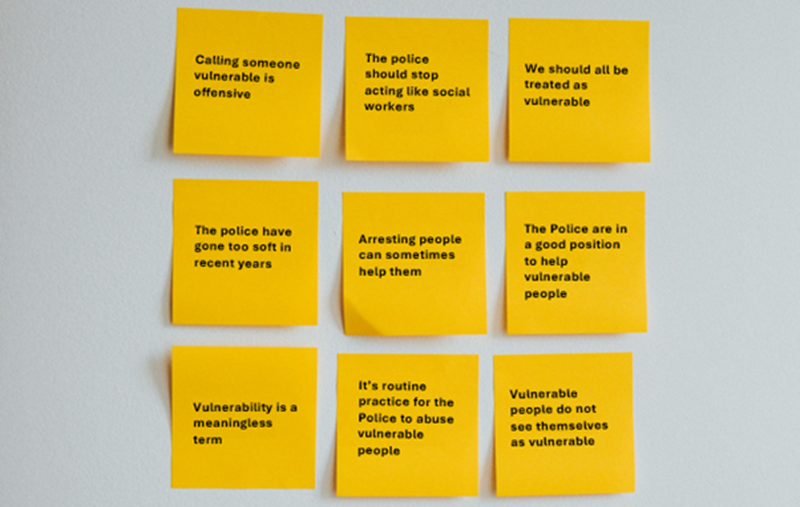Read our short, accessible reports that summarise findings and recommendations from our Centre research projects.
County lines, policing and vulnerability
This report outlines findings from the UK’s first national study of police responses to county lines drug distribution and related child and adult criminal exploitation.

Do people think police are
meeting minimum standards
of service delivery?
The report covers a nationally representative survey of 1,500 people and finds that police services across Britain are failing to meet the public’s minimum standards of service delivery.

What do the public want from police? Towards a minimum policing standard
This project explored what the public want and expect from local policing. This study showed that there is considerable agreement among the public about what service police should provide and on the minimum standards to which police should adhere.

Co-designing community resilience to online child sexual exploitation and abuse victimisation
The aim of this two-year project was to take a place-based and problem-oriented approach to understand and improve offline responses to online child sexual exploitation and abuse.

Service provision for vulnerable
people in contact with policing:
a strategic view from Bradford
This place-based study mapped services used by vulnerable people in contact with the police across Bradford, through interviews with senior managers in public, private and third sector organisations.

Viewpoints on vulnerability as a focus for policing and public services
This project explored differing viewpoints on the role and value of vulnerability as an organising focus around which public services and police address situations of harm.

Developing AI tools to help quantify police involvement with vulnerable people
The research team instructed large language models (LLMs) to identify vulnerability indicators in unstructured police incident logs and evaluated how they performed compared to human coders.

Responding to family violence/domestic abuse: lessons from Greater Manchester (UK) and Victoria (Australia)
This study aimed to explore Greater Manchester’s response to family violence/domestic abuse, with a particular focus on how responses to perpetrators featured within the strategies and their implementation.

Connected data analytics reports
Estimating the nature and scale of response police demand
Using police incident data, the project team analysed the nature and scale of response police demand across the Bradford District. Results show that police respond to diverse incidents daily, with the burden on their resources varying significantly.

Geospatial and sociodemographic patterns of unauthorised school absence
Using attendance records obtained from the Department for Education, the team analysed the pre-pandemic rates of unauthorised absences across the Bradford District between 2012 and 2019.

School absence and Not in Education, Employment or Training
The team investigated the association between school absence (6-16 years of age) and risk of being Not in Employment, Education, or Training (NEET) (16-18 years of age) using records provided by the Department for Education

School absence, academic attainment, and young adults Not in Education, Employment or Training
The research team explored relationships between school absence, academic attainment and later NEET status in over 15,000 Bradford-based children that attended school between 2005 and 2018.

Early Career Researcher Development Fund reports
Domestic abuse service providers and their stories
This project aimed to investigate the power and persistence of dominant narratives in relation to domestic abuse (DA), as witnessed by service providers who support both victims and perpetrators.

This project found that offenders use social media across all crime stages, from the identification and recruitment of victims to their exploitation and control. Different apps and social media tools are used at different stages and for different purposes.

When it hurts to seek help: identifying non-harmful routes to support for families living with child-to-parent violence and abuse
Working collaboratively with families living with child-to-parent violence and abuse and collaborative research partners, this project identified new, appropriate, and non-harmful pathways to support and intervention.

Reducing barriers to reporting sexual harassment through enhanced police procedural justice for racially minoritised young women
This project aimed to examine the link between racially minoritised young women and girls’ perceptions of a lack of procedural justice and barriers to reporting public sexual harassment to the police.

Lost in translation: raising awareness of Roma culture within policing
This project aimed to provide Roma communities in Bradford with a voice and to explore what it means to be Roma, alongside capturing police perceptions of what being Roma means.

Recognising the risks and harms
for repeat missing children from
different residential environments
through a child and practitioner lens
This study demonstrates the substantial and escalating harm which exists for repeat missing children from non-looked-after environments.

Funded projects
Defendants as victims: a scoping review of vulnerability, victimhood and safeguards from charge to conviction
This report identifies key barriers to recognising suspects and defendants as victims of crime through each stage of the criminal justice system. The project also identifies priority areas for reform and future research..

The increase in statutory duties on public officials to protect vulnerable people
This research project found that there has, across the last three decades, been an increase in legislation which imposes upon public officials duties to protect vulnerable people, particularly in legislation passed by the Scottish Parliament.

Translational Fellowship report
Reframing the narrative of neurodivergent suspects of Counter Terrorism: The true victims of exploitation by algorithms
This study explored the intersection between neurodiversity, extremism and online algorithms, identifying gaps in practitioners’ understanding.


Social media-facilitated trafficking of children and young people